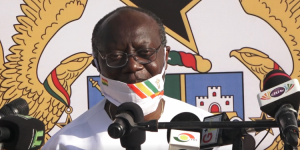With government’s dream of seeing to it that every square inch of the nation is covered when it comes to quality telecoms and digital products and services, MTN Ghana and Vodafone – the two biggest telecom and digital service providers – have entered a strategic partnership to implement the national roaming service.
Currently set to begin under a pilot scheme in the Volta Region, the agreement is a major step to attaining universal access and accelerating digitalization in line with the country’s ambitions of becoming a digital economy, in which a national roaming system is crucial. With a successful implementation, it is expected to include all other service providers.
Already, two smaller players, ArtelTigo and Glo, a week ago announced a deal that sees Glo subscribers leverage AirtelTigo infrastructure for quality services on their voice, data and SMS plans. So far, all Glo customers are now automatically latched onto the AirtelTigo network.
Patricia Obo-Nai, CEO of Vodafone Ghana, in a statement said: “The implementation of national roaming will enable Vodafone Ghana customers to stay connected in areas outside our current locations of coverage. This is especially important for rural communities, as national roaming invariably provides a greater choice of network providers.
“We believe strongly that the collaboration in Volta Region is a positive step, and working together with government, the regulator and MTN Ghana we look forward to extending the national roaming service beyond the Volta Region in due course.
“This agreement is a milestone for the industry and is in line with our Ambition 2025 strategic intent of ‘Leading digital solutions for Africa’s progress’,” said CEO of MTN Ghana, Selorm Adadevoh.
“MTN fully supports government’s National Roaming plans. We acknowledge that national roaming will extend network coverage for Ghanaians nationwide and support growth of the Ghana Telecommunications industry. Our engineers have worked tirelessly to test and develop solutions to various challenges encountered along the journey, and we are excited about what lies ahead in this partnership with Vodafone Ghana,” Mr. Adadevoh added.
“Over the coming months, the pilot’s outcome will be instrumental in developing the partnership’s next phase to cover more complex technical configurations for nationwide roaming on either network. We will update the market in due course.
“We take the opportunity to thank the National Communications Authority (NCA) for their support and engagement through the process, and for their approval for us to proceed with this pilot. We also thank the Ministry of Communications and Digitalization for putting in place the policy framework to support such a partnership for the industry at this stage of the Ghana Telecommunications industry evolution. We are confident that this is just one of many forward-looking policies to come in safeguarding the industry’s viability into the future,” the statement added.
MTN Ghana’s move to implement a national roaming plan is in fulfillment of a regulatory remedy regarding its significant market power (SMP) status. MTN was named SMP in June 2020 because, as government said, it had controlled more than 75 percent of the telecoms market in terms of voice, data, SMS and mobile money for a long while.
In its full year report for 2021, MTN stated it has so far fully implemented three of the seven conditions and is close to rolling out the fourth one, which is national roaming. ”We have made significant progress in our discussions with the regulator to implement a national roaming programme in the country,” the report said.
One government official who will be hugely satisfied with this move is none other than Ursula Owusu-Ekuful, Minister of Communications and Digitalization. Ms. Owusu-Ekuful has championed the national roaming agenda for years, and very recently touched on the subject again.
Speaking at an official engagement a couple of weeks ago, she said the national roaming scheme will open up rural folks to the national economy and make accessibility to government services easier, especially for business purposes.
“We are bent on ensuring that the digital economy is felt in all parts of this country, hence government will support all partners to attain this vision. We are embarking on an aggressive rural telephony and national roaming project,” she said, adding that “this will ensure every corner of the country has access to mobile networks – both voice and data. It will also accelerate rural economic growth and open up the economy to our rural and underserved folks as well.”







